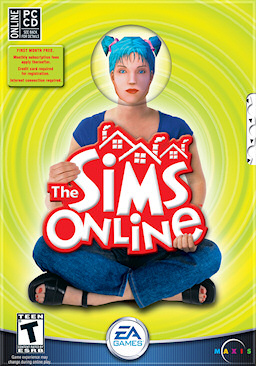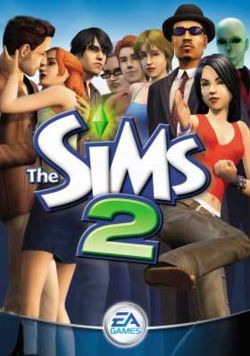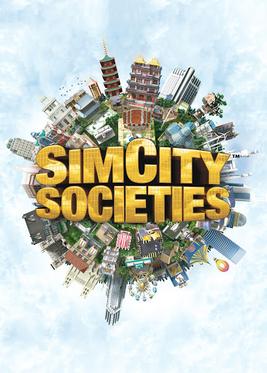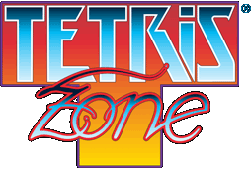
SimCity 4 is a city-building simulation computer game developed by Maxis, a subsidiary of Electronic Arts. The game was released in January 2003 for Microsoft Windows and in June 2003 for Mac OS X. It is the fourth major installment in the SimCity series. SimCity 4 has a single expansion pack called Rush Hour which adds features to the game. SimCity 4: Deluxe Edition contains the original game and Rush Hour combined as a single product.

The Sims Online was a 2002 massively multiplayer online game (MMO) developed by Maxis and published by Electronic Arts (EA) for Microsoft Windows. The game was a subscription-based online multiplayer version of the 2000 Maxis game The Sims, in which players could interact with others on virtual user-made lots, buy and customise properties, and make in-game money by taking on jobs. The Sims Online was the project of Maxis founder and Sims creator Will Wright, who sought to create an open-ended online game based on social interaction, with ambitions for the game to be a platform for emergent gameplay and the creation of virtual societies and politics. In line with these ambitions and the prior commercial success of The Sims, The Sims Online received considerable pre-release coverage, with expectations that it would be successful and break new ground for online multiplayer games.

The Sims 2 is a 2004 social simulation video game developed by Maxis and published by Electronic Arts. It is the second major title in The Sims series, and is the sequel to The Sims. The game was released for Microsoft Windows on September 14, 2004, and a port for MacOS by Aspyr was released on June 17, 2005. Eight expansion packs and nine "stuff packs" were subsequently released between 2005 and 2008. In addition, versions of The Sims 2 were released on various video game consoles, including the PlayStation 2, Xbox, Nintendo DS, and GameCube, and mobile platforms, including the Nokia Ovi Store. Unlike the original, the handheld and console versions are more storyline-based. The three handheld versions of the game are completely different among themselves, unlike the home console versions of the game, which are virtually identical to each other. A sequel, The Sims 3, was released in June 2009.

Multi Theft Auto (MTA) is a multiplayer modification for the Microsoft Windows version of Rockstar North games Grand Theft Auto III, Grand Theft Auto: Vice City and Grand Theft Auto: San Andreas that adds online multiplayer functionality. For Grand Theft Auto: San Andreas, the mod also serves as a derivative engine to Rockstar's interpretation of RenderWare.

Lumines: Puzzle Fusion is a 2004 puzzle game developed by Q Entertainment for the PlayStation Portable (PSP). During the game, players must strategically arrange falling 2×2 blocks comprising two colors to form single-color 2×2 squares. A vertical "time line" sweeps across the field, erases completed squares, and awards points. Each stage features a unique skin that influences the background, block colors, accompanying music, and the time line's speed.

The Sims 3 is a 2009 social simulation video game developed by the Redwood Shores studio of Maxis, and published by Electronic Arts. Part of The Sims series, it is the sequel to The Sims 2. It was released on June 2, 2009, for Microsoft Windows, MacOS, and mobile versions. Console versions were released for PlayStation 3, Xbox 360, and Nintendo DS in October 2010 and a month later for Wii. The Windows Phone version was released on October 15, 2010. A Nintendo 3DS version, released on March 27, 2011, was one of the platform's launch titles.
The Sims Stories is a series of video games from The Sims series released between 2007 and 2008, based on a modified version of The Sims 2 game engine. The modified game engine is optimized for play on systems with weaker specifications, such as laptops. As such, its system requirements are lower than that of The Sims 2, but it can still be played on desktops. The series was aimed to cater to three groups of players: players who wish to play The Sims 2 on their laptops ; players who wish to engage in other activities such as instant messaging while playing the game; and players who are new to the franchise. Titles in this series are categorized as "laptop-friendly" since they do not require a dedicated graphic card.
SimCity is an open-ended city-building video game franchise originally designed by Will Wright. The first game in the series, SimCity, was published by Maxis in 1989 and was followed by several sequels and many other spin-off Sim titles, including 2000's The Sims, which itself became a best-selling computer game and franchise. Maxis developed the series independently until 1997, and continued under the ownership of Electronic Arts until 2003. EA commissioned various spinoffs from other companies during the 2000s, focusing on console and mobile releases. A 2013 EA-Maxis reboot was subject to what has been described as "one of the most disastrous launches in history", which may have triggered the 2015 shutdown of Maxis Emeryville and the end of the franchise.

SimCity Societies is a city-building simulation video game developed by Tilted Mill Entertainment and published by Electronic Arts, and is part of the SimCity series. The gameplay is significantly different from previous SimCity titles, with a greater focus on social development. SimCity Societies was released in 2007, and received mixed reviews, with praise for the game's improved accessibility and visuals, but criticism for being oversimplified and having poor performance.

Blocktrix is a free, online, multiplayer, puzzle game based on TetriNET and was created in 2000 by StrikeLight. It was developed as an update to the official TetriNET 1.13 client after the original creator, St0rmCat, created a new version to the game entitled TetriNET 2, which included major changes to the TetriNET client such as not allowing private servers. While Blocktrix is compatible with TetriNET servers, the Blocktrix protocol itself adds features to Blocktrix specific servers which makes it a different game altogether.

SimCity Creator is a city-building game for the Nintendo DS video game console. It was released in the Western world in September 2008, alongside its Wii counterpart. In Japan it was released several months ahead on March 19, 2008, as a sequel to SimCity DS under the name SimCity DS 2: Kodai kara Mirai e Tsuduku Machi.

The Sims is a series of life simulation video games developed by Maxis and published by Electronic Arts. The franchise has sold nearly 200 million copies worldwide, and is one of the best-selling video game series of all time. It is also part of the larger Sim series, started by SimCity in 1989.

SimCity Creator is a video game in the Sim game series by Electronic Arts. It was released for the Wii in 2008.

A sandbox game is a video game with a gameplay element that provides players a great degree of creativity to interact with, usually without any predetermined goal, or alternatively with a goal that the players set for themselves. Such games may lack any objective, and are sometimes referred to as non-games or software toys. More often, sandbox games result from these creative elements being incorporated into other genres and allowing for emergent gameplay. Sandbox games are often associated with an open world concept which gives the players freedom of movement and progression in the game's world. The term "sandbox" derives from the nature of a sandbox that lets people create nearly anything they want within it.

Train Simulator Classic 2024 is a train simulation game developed by Dovetail Games. It is the successor to Rail Simulator, and was released online on 12 June 2009 and in stores on 3 July.

LittleBigPlanet is a puzzle platform video game series created and produced by British developer Media Molecule and published by Sony Interactive Entertainment. Most games in the series put a strong emphasis on user-generated content and are based on the series' tagline "Play, Create, Share". The tagline represents the three core elements of the series: playing alone or with others locally or online, creating new content using the in-game creation tools, and sharing creations and discoveries online with other players.

Magic: The Gathering Arena or MTG Arena is a free-to-play digital collectible card game developed and published by Wizards of the Coast (WotC). The game is a digital adaption based on the Magic: The Gathering (MTG) card game, allowing players to gain cards through booster packs, in-game achievements or microtransaction purchases, and build their own decks to challenge other players. The game was released in a beta state in November 2017, and was fully released for Microsoft Windows users in September 2019, and a macOS version on June 25, 2020. Mobile device versions were released in March 2021.

Tetris Zone is a Tetris game for the Macintosh platform and was released as a Universal binary for Apple computers. A Windows version was later released. It was one of the first games that attempted to limit the effects of T-spins on the game, by eliminating the recognition of T-spins triples. However, singles and doubles that use the TST twist are still recognized. In 2014, the game support was discontinued and it can no longer be downloaded. It is Alexey Pajitnov's favorite version of Tetris.
















